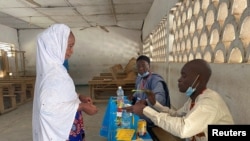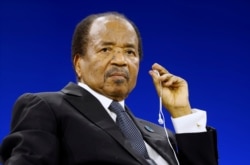Cameroon’s ruling party scored a landslide victory in the country’s first regional elections, winning nine of the country's 10 administrative regions. The victory has triggered fears the party will not relinquish some powers to regional governments – a promise made to end the ongoing separatist crisis in two western regions. Central government officials are promising to reduce their grip on power.
The electoral commission said the CPDM, the party of longtime President Paul Biya, won a majority of the seats in nine of the central African state’s 10 regions. The opposition National Union for Democracy and Progess won control of one region. Each region has a council of 70 seats.
Joel Emmanuel Bitounou of CPDM won a seat in in the southern town of Ebolowa. He says he expects the central government in Yaoundé will for the first time since independence in 1960, relinquish some of its power.
He says the hypercentralized system left over from the colonial period is old and outdated. He says that by successfully conducting the elections, Cameroon has given a strong indication that it is open to decentralization. He says the regions are now expecting some financial and administrative autonomy.
No political party has contested the results. The government says it is counting on the regional elections to end the separatist crisis in the western English-speaking regions, where armed groups want to break away from Cameroon and its French-speaking majority.
Under the new system, each region will have regional bodies responsible for economic, health, social, educational, sports and cultural development affairs.
The central government in Yaoundé says it will transfer some of its powers to the regions and, starting next year, the regions will be able to recruit hospital staff and teachers and build some of their infrastructure. The government says it will also give 15% of its 2021 budget to the regions to manage.
The elections end a process that will implement a special status for the English-speaking Northwest and Southwest regions, as decided during a 2019 grand national dialogue that was held in Yaoundé.
However, separatist leaders invited to the national dialogue refused to attend. Some opposition political parties refused to take part in Sunday’s elections, saying the electoral laws favored Biya’s party.
Bongwong Justin Berinyuy is coordinator for the Center for Human Rights and Democracy in Africa in Cameroon’s Engish-speaking North-West Region. He says the regional elections and the special status given to the English-speaking regions are not strong enough to stop the separatist crisis.
"Those who were advocating for more autonomy in the Anglophone regions were not asking for a special status," said Berinyuy. "Some of them are still radical today because they were excluded from the deliberations that adopted that particular special status and then the implementation may also be a failure because it is being imposed to them. It is not what they wanted."
Berinyuy said the CPDM victory indicates that Biya, who has been in power for 38 years, will continue dictating to a majority of local elected officials who are members of his party.
Speaking Friday, government spokesperson Rene Emmanuel Sadi affirmed the government will devolve powers to the region. He said the decentralization process will not lead to a breakup of Cameroon.
"The acceleration of the decentralization process in Cameroon, is called upon to consolidate and solidify local governance but it cannot be equated with the death of the state," said Sadi. "In all the countries where this system has been set up, it is a gradual and evolutionary deployment, step after step, marked through periods of evaluations and reforms."
Violence in Cameroon's English-speaking regions began in 2016 when teachers and lawyers protested alleged discrimination at the hands of the French-speaking majority.
The government responded with a crackdown and separatists took up weapons, claiming that they were defending civilians. The fighting has killed at least 3,000 people and displaced over 530,000, according to the United Nations.






